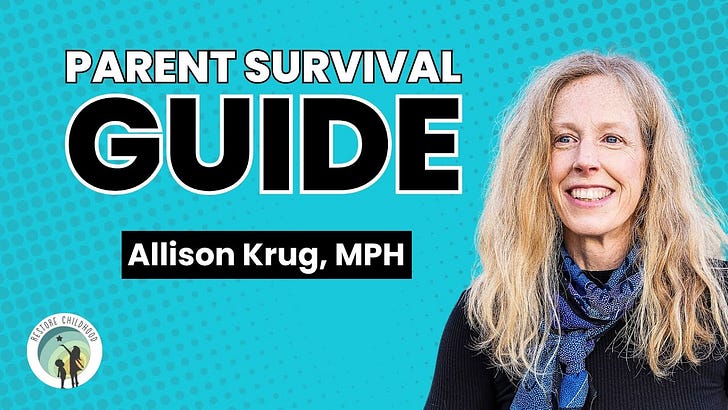A Call for Less Timid Parenting
Parents can play a powerful role in setting the conditions for good mental health
Today, we’re pleased to share a conversation with epidemiologist/executive coach Alli Krug. Alli shares some tips on how parents can help kids struggling with mental health and gender dysphoria, the impact of psychiatric medications, and how parents can be more present with their kids.
Here’s Alli, above in conversation, and in her own words, below.
Alli Krug:
This conversation focuses on what parents can do to support their children and adolescents through the greatest psychological experiment in human history.
In some ways I recoil at such catastrophic language because we assume that this is the hardest time to be an adolescent that humanity has ever known.
How sure are we that it has never been more challenging?
Difficult times have crossed the view of every human for all time. All of us have been exposed to grief, loss, love, self-doubt, jealousy, greed, fear and hate. As our eighteen-year-old son pointed out the other night, we have all been shaped by exposures throughout life, whether digital or not, which may induce addictions of various kinds that we need to manage through adulthood.
As he said that, I realized he may be right. While I was not affected by social media as an '80s teen, I did develop severe anorexia - a manifestation of my own response to early childhood events that accumulated through adolescence.
While our pasts shape our response to the present, we are also sculpting our everyday moments to secure a future which we can't possibly ensure will come to pass. A natural response to this collision of past and future on the present would be doubt, trepidation, uncertainty and potentially anxiety for some parents. These are normal responses to the turbulence of life and our desire to protect our children.
What Natalya prompted me to think more carefully about during this conversation is how timid parents have become, leading many to rush for outside expertise. Yes, I think parenting should be a strong partnership, but not between parent and therapist. The partnership should be between parent and child, built on a framework of increasing individual self-awareness and agency. Building a child’s capacity for agency, however, does not mean yielding control to the child's immature psyche.
What it does mean is co-creating with our children a meaningful existence which carves out the time for self-inquiry, even in moments of duress and doubt.
Pushing this point further, I believe the media has eroded the agency of GenZ and GenAlpha by asserting they are uniquely challenged. This false prophecy denies them hope.
As they come of age, they read and hear: "GenZ is doomed." Young adults have experienced increasing rates of clinically treated depression. Parents have lost confidence in their own ability to lead their families, and they quickly turn to professionals (psychologists, counselors, psychiatrists and doctors) to find "the answer." Yet it does not exist outside of us, it exists within each of us.
We are capable of powerful discernment.
As a professional coach, I see this every time I meet with a client. Coaches are trained to hold a compassionate, non-judgmental space for clients so they can do the work of exploring the terrain within. We ask open-ended, empowering questions but leave the client to discern what is best for them.
Leading or close-ended questions are off-limits.
If I would like to offer an observation, I ask the client for permission and allow the client to process it and take from the observation what is meaningful or relevant and leave the rest.
I have no ego, no attachment to the outcome.
As I have gained practice in this approach, I find that the power of one question is limitless. I'm also encouraged because I see the transformative power of human connection and hope. But I'm also quite aware of how much better it would have been had I begun this training years ago. How many times in my life have I missed a chance to more deeply understand another human being?
How might my own children have benefited if I hadn't been such a Type-A project manager and instead really tapped into, with genuine interest, what engages them? My husband and I did a good job of that when they were young, but the pressures parents face as kids hit the teen years—to have a "PLAN" that offers them security and a life—can nudge this genuine interest and engagement off course.
I responded to missing assignments and failing grades by shifting full-on into project management mode where too much of me was attached to the outcome and my son felt lost in the mix or worse—rebellious, defiant, oppositional, and detached, unreachable.
On our way to school one day, I realized that my son’s work as a visual effects artist offered me a way forward to increase my capacity for understanding. Camera angles are important in setting scenes. As he sat next to me in our aging Xterra on a frosty morning heading to a building he loathed, I adopted his POV (point of view). I truly listened that morning, and every morning, and afternoon, for a few weeks. I listened not to manage, but to understand and reflect, acknowledge and validate his perspective. When we got home, I learned not to turn the engine off—that change in sensation would signal the conversation was over. I didn’t care how long we sat burning gas as long as he’d continue guiding me up the trail so I could join him on his metaphorical perch overlooking the terrain below.
In this moment, it is crucial that our children be equipped with the ability—and the desire—to inquire within. To pay attention to quiet moments and the voice within which whispers, “Something is off.” They can't possibly do this if they are tuned in all the time to other inputs. It is imperative that we set up a rhythm of life which allows them to build habits of solitude and the space to process.
This takes time. A LOT of time. In the interview, I open up about my battle with anorexia in high school and how only now do I really understand some of what drove it.
While labeling disorders can be helpful, allowing you to be a more empathetic parent, they can also create a self-fulfilling prophecy and may deny the child's ability to flourish on their own unique path. We talk more about this in the interview as well.
I appreciated this opportunity to reflect on the great questions parents face today—exposure to social media, graphic images in the news, managing diet, exercise, sleep, and mental health. In this unscripted, no-prep conversation, we talk about what we know based on our shared experiences (we're the same age!) and what we aspire to as parents: raising conscious humans capable of making choices that serve them well.
Practically speaking, what can parents do? I offer actionable steps humbly, knowing it is an unfinished list. This is just one conversation, but I hope one that leaves you feeling heard, known, appreciated and encouraged. Please find a number of references below which may be helpful. If you would like to dig into the microbiome, mental health and autoimmunity more, please visit a series of seminars I developed for health coaches here.
Thank you, Natalya, for your passion for children. And thank you, parents, for listening. I hope you enjoy and would love to hear what you think.
Alli Krug, MPH
Epidemiologist and professional coach
Follow Alli on Twitter
REFERENCES
Review
Effects of physical activity in child and adolescent depression and anxiety: role of inflammatory cytokines and stress-related peptide hormones (Child Adolesc Psychiatry Ment Health. 2022) Exercise is an effective primary prevention and treatment addition for depression in adults, however the literature on adolescents is promising but sparse.
Randomized controlled trials
Exercise therapy among hospitalized adolescents (J Affect Disord, 2022): A structured exercise program added on to the psychiatric hospitalization of adolescents reduced their depressive symptoms.
Resistance exercise training (RET) reduces anxiety among young adults (RCT), (Scientific Reports, 2020): Resistance training significantly reduced anxiety symptoms (p ≤ 0.001).
Link between exercise and changes in gut microbiota (Psychiatry Res. 2023)
Surf therapy among Australian teens ages 8-18, RCT (Psychol Sport Exerc, 2023) Children and adolescents experienced reduced symptoms of depression, anxiety, emotional problems, peer problems, hyperactivity/inattention, but these improvements were not sustained 6-weeks after the intervention.
Mobile phone-based exercise RCT among adults in South Korea (JMIR Mhealth Uhealth. 2023) Decreased depression and stress observed in the treatment group receiving a mobile-phone-based exercise program vs the waitlist group.
Nature prescriptions reduce anxiety and depression in adults (Lancet, 2023): Nature prescription programs can reduce high blood pressure (both systolic and diastolic) and had a moderate to large effect on depression and anxiety scores.
Meta-analysis
Systematic Review and Meta-Analysis of the Effects of Exercise on Depression in Adolescents. (Child and adolescent psychiatry and mental health, 2022) For adolescents with depression, aerobic exercise or resistance training plus aerobic exercise interventions lasting 6 weeks, 30 min/time, and 4 times/week had optimum results; yoga was not significant.






I loved listening to this conversation! Dr. Krug provides such reasonable and knowledgeable information on ways to support children. I agree with so much of what she has to say and loved the part at the end, we definitely need to foster critical thinking! Thank you!